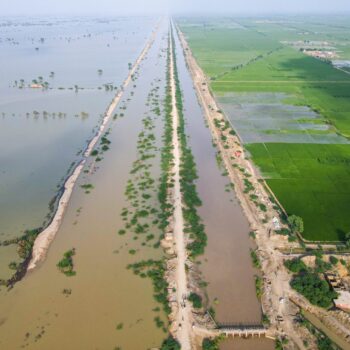The old order of managing the global finance system has changed. With this shift, comes the development of a sustainable finance system as a priority for the sake of the planet.
With so many countries, businesses and interests involved it is not clear what this should look like. What is clear however, is that international cooperation and collaboration are the key ingredients to delivering a stable sustainable finance system.
Ominous signs
At a recent conference on post-Brexit financial regulation, a former Deputy Governor of the Bank of England spoke on the things that matter most for the businesses of the City of London. He boiled it down to three things: sound finance; honest finance and transparency. These are his criteria for stability, and he isn’t convinced they’re being adhered to.
Other speakers, including former Ministerial advisors and leading academics, noted current economic data points are setting off alarm bells. Global debt is 300% of global gross domestic product, while US corporate debt has climbed above the previous record set in 2007 just before the last major financial crisis. Plus, salaries of securities traders on Wall Street are at their highest ever level.
New players at the table
What was clear from the discussions, is Europe and the US will no longer hold the reins when it comes to global negotiations to sort out potential crises. China and India wield more power than ever and will play much stronger roles. With Brexit and Trump, the EU is left with a weakened transatlantic alliance with which to coordinate a recovery, while China and India will be learning near enough from scratch on how to lead a repair of the financial system. What is more, tariffs, trade wars and populism are thickening this geopolitical plot.
Still, there is no crisis just yet, and as E3G Senior Researcher Dileimy Orozco argues in her piece on the positive legacy of the last financial crisis, there is work underway in jurisdictions across the world to incorporate sustainable finance for stability. Sustainable finance has stability at its core by virtue of its emphasis on long term investment, de-risking and disclosure. Consequently, this raises the stakes and importance of continued system change if ever the warning lights for another financial crisis begin to flash.
A visit from the EU
In a globally connected financial system, it is more important than ever to coordinate, collaborate and learn from each other to reinforce progress on sustainable finance. At Climate Week NYC, the Principal Advisor to the EU Director General for Climate Action, Jacob Werksman, hosted a roundtable with leaders from the US and Europe's financial sectors. It showcased the EU's Action Plan on Sustainable Finance and created dialogue on the best ways to expedite change while instilling enthusiasm for sustainable finance globally.
It was highlighted yet again that cooperation with counterparts around the world is imperative for sustainable finance to succeed. Moreover, it is imperative for business and government in every jurisdiction to be working together effectively to drive change.
Getting business on board
Sean Kidney, CEO, Climate Bonds Initiative, spoke with resounding positivity on the relationships between the European Commission and the High-Level Expert Group on Sustainable Finance and Technical Expert Group. Reiterated by speakers from Citi, JP Morgan Chase, Goldman Sachs and BlackRock on the US side, it cannot be overstated how important it is for policy-makers to bring industry along.
From the EU example, while self-regulation and voluntary standards for green bonds have been a la mode for some time, there is increasing appetite for regulated standards.The Green Bond market has grown without any regulations according to Sean Kidney, who also stated that we need to change the incentives, and we need precision in standards, which voluntary standards cannot provide to the right degree. Ultimately, the incentives won’t work unless there is confidence that green means green.
The same can be said for the EU proposals for a sustainable finance taxonomy, where financial leaders from both sides of the Atlantic recognized the benefits of regulating to provide confidence and clarity that will “turbo-charge” the reallocation of capital towards climate investments. However, there were words of warning: the first stage of a taxonomy (voluntary) has been in line with industry’s whims. But the second stage is moving into regulation, which industry as a whole may not receive so warmly without a level playing field.
Which brings us back to global collaboration. Green Bond Standards and a Taxonomy in the EU will drive progress, but if they are to be truly successful, these efforts must be globalized and syndicated.
Climate Week NYC
At Climate Week NYC a string of announcements illustrated ambition for global collaboration on sustainable finance. Michael Bloomberg announced he will lead the newly established Climate Finance Leadership Initiative to fulfil the private financing agreements mentioned in the Paris Agreement. The Central Banks and Supervisors Network for Greening the Financial System (NGFS) also announced it will launch its first report in April 2019. There will be a One Planet Summit in Nairobi during Africa Climate Week 2019. And, the UN Secretary-General Climate Summit in September 2019 will play host to the next meeting of the Global Innovation Lab for Climate Finance, acting as the reference point for countries to show they’re "putting the policies and instruments in place to achieve the transformation of the economy we need."
These follow significant developments in relations with Asia. The China-EU investment summit in 2019 will start the dialogue on sustainable finance collaboration, including harmonization of taxonomies presenting a boon to global guidance.
As the post-Brexit regulation folk stated, China, India and other (now) weightier economies will play much larger roles in the event of a financial crisis. But equally, they are already playing leading roles in scaling sustainable finance. With this cooperation and collaboration and the relationships developed as a result we are refining the tools required to address climate change collectively while averting instability.


